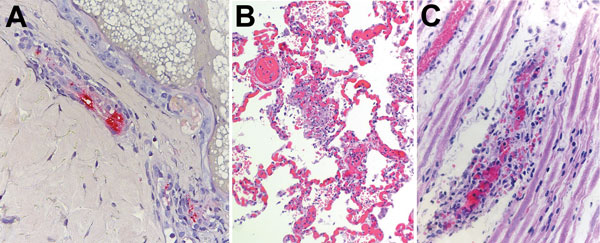Volume 23, Number 10—October 2017
CME ACTIVITY - Synopsis
Fatal Rocky Mountain Spotted Fever along the United States–Mexico Border, 2013–2016
Figure

Figure. Histologic slides of autopsy tissue from patients who acquired Rocky Mountain spotted fever in northern Mexico and died at hospitals in the United States, 2013–2016. A) Immunohistochemical stain of Rickettsia rickettsii antigens (red) in inflamed blood vessel adjacent to eccrine gland in a skin biopsy specimen from case-patient 1. Immunoalkaline phosphatase with naphthol-fast red and hematoxylin counterstain; original magnification ×50. B) Diffuse pulmonary capillaritis in case-patient 4. Hematoxylin and eosin stain; original magnification ×50. C) Vasculitis involving a small blood vessel in a peripheral nerve of case-patient 4. Hematoxylin and eosin stain; original magnification ×100.
Page created: September 18, 2017
Page updated: September 18, 2017
Page reviewed: September 18, 2017
The conclusions, findings, and opinions expressed by authors contributing to this journal do not necessarily reflect the official position of the U.S. Department of Health and Human Services, the Public Health Service, the Centers for Disease Control and Prevention, or the authors' affiliated institutions. Use of trade names is for identification only and does not imply endorsement by any of the groups named above.